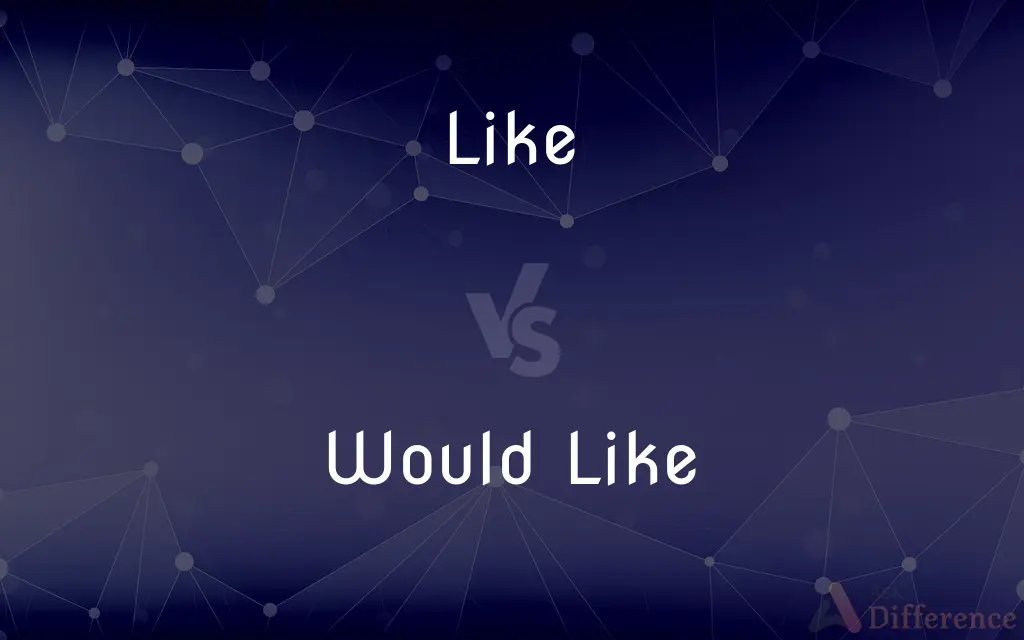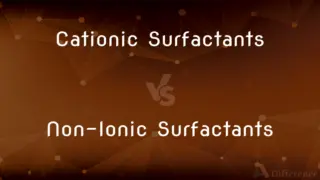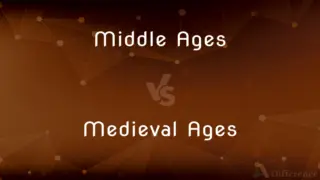Like vs. Would Like — What's the Difference?
"Like" expresses enjoyment or preference, while "would like" indicates a polite desire or wish, often used for making requests or offers.

Difference Between Like and Would Like
Table of Contents
ADVERTISEMENT
Key Differences
"Like" is a versatile verb used to express a feeling of enjoyment or approval towards someone or something. It indicates a preference or taste, describing what someone finds pleasing. For example, saying "I like chocolate" simply states a fact about someone's taste preferences. "Like" can also be used to make comparisons, as in resembling or being similar to someone or something, highlighting its broad usage in English.
"Would like," on the other hand, is a polite expression of desire or wish, particularly in the context of making requests or stating preferences in a courteous way. It is the conditional form of "like" and is often used when asking for something or expressing what one wants to do, without implying a direct action. For instance, saying "I would like to visit Paris" expresses a wish or intention rather than a firm plan.
The difference between "like" and "would like" lies in their application and the level of politeness or formality. While "like" is direct and straightforward, "would like" softens statements, making them more polite or tentative. This distinction is particularly important in social interactions, where "would like" is favored in polite requests, invitations, or expressing desires in a more formal or considerate manner.
"Like" functions across various contexts, from expressing personal preferences to making comparisons or indicating enjoyment. "Would like" specifically targets the expression of polite wishes or desires, focusing on future possibilities or intentions. Understanding when to use each can greatly impact the tone and clarity of communication.
In essence, while both "like" and "would like" share a root in preferences and desires, their usage reflects different degrees of politeness, intention, and context. "Like" deals more with general preferences and enjoyment, whereas "would like" is tailored towards expressing desires and wishes politely, especially in social or formal settings.
ADVERTISEMENT
Comparison Chart
Function
Expresses enjoyment or preference
Indicates a polite desire or wish
Context
General usage for preferences
Used for polite requests or future intentions
Politeness
Direct
More polite and formal
Tense
Present form
Conditional form
Example
I like coffee.
I would like a cup of coffee, please.
Compare with Definitions
Like
Expresses enjoyment or approval.
I like sunny weather.
Would Like
Implies conditional or future intentions.
I would like to visit Japan someday.
Like
Can indicate habitual actions.
They like to go hiking on weekends.
Would Like
Used for making polite requests.
Would you like to join us for dinner?
Like
Used to describe similarities.
He runs like the wind.
Would Like
Softens statements to sound less direct.
I would like some help with this, please.
Like
To find pleasant or attractive; enjoy
Do you like ice cream? I like your style.
Would Like
Indicates preference in a formal context.
We would like the meeting scheduled for Thursday.
Like
To want to have
I would like some coffee.
Would Like
Expresses a polite desire or wish.
I would like to order dessert now.
Like
To prefer
How would you like your coffee—with sugar or without?.
Like
To feel about; regard
How do you like these new theater seats?.
Like
To believe or predict that (a certain competitor) will win a contest
Which team do you like in tonight's game?.
Like
To perform well under (a given condition) or using (a given feature)
This car does not like cold weather. The engine does not like enriched fuel.
Like
(Archaic) To be pleasing to.
Like
To have an inclination or a preference
If you like, we can meet you there.
Like
(Scots) To be pleased.
Like
Something that is liked; a preference
Made a list of his likes and dislikes.
Like
One similar to or like another. Used with the
Was subject to coughs, asthma, and the like.
Like
Often likes(Informal) An equivalent or similar person or thing; an equal or match
I've never seen the likes of this before. We'll never see his like again.
Like
Possessing the characteristics of; resembling closely; similar to
Your house is like mine.
Like
In the typical manner of
It's not like you to take offense.
Like
In the same way as
Lived like royalty.
Like
Inclined or disposed to
Felt like running away.
Like
As if the probability exists for
Looks like a bad year for farmers.
Like
Such as; for example
Saved things like old newspapers and pieces of string.
Like
Possessing the same or almost the same characteristics; similar
On this and like occasions.
Like
In the manner of being; as if. Used as an intensifier of action
Worked like hell.
Ran like crazy.
Like
(Informal) Probably; likely
Like as not she'll change her mind.
Like
Nearly; approximately
The price is more like 1,000 dollars.
Like
(Nonstandard) Used to provide emphasis or to focus attention on something
Let's like talk about this for a minute. It's like so crowded you can't move.
Like
In the same way that; as
To dance like she does requires great discipline.
Like
As if
It looks like we'll finish on time.
Like
To enjoy, be pleased by; favor; be in favor of.
I like hamburgers.
I like skiing in winter.
I like the Seattle Mariners this season.
Like
To please.
Like
(obsolete) To derive pleasure of, by or with someone or something.
Like
To prefer and maintain (an action) as a regular habit or activity.
I like to go to the dentist every six months.
She likes to keep herself physically fit.
We like to keep one around the office just in case.
Like
(obsolete) To have an appearance or expression; to look; to seem to be (in a specified condition).
Like
(archaic) To come near; to avoid with difficulty; to escape narrowly.
He liked to have been too late.
Like
To find attractive; to prefer the company of; to have mild romantic feelings for.
I really like Sandra but don't know how to tell her.
Like
(obsolete) To liken; to compare.
Like
To show support for, or approval of, something posted on the Internet by marking it with a vote.
I liked my friend's last status on Facebook.
I can't stand Bloggs' tomato ketchup, but I liked it on Facebook so I could enter a competition.
Like
(with 'would' and in certain other phrases) To want, desire. See also would like.
Would you like a cigarette?
We could go to the museum if you like.
I don't like to disturb him when he's working.
Like
To accept as an input.
We were frustrated that our seeming innocent choice for a team name was rejected by the censor. Apparently somewhere in the name is a word that the censor doesn’t like.
Like
To be likely.
Like
Something that a person likes (prefers).
Tell me your likes and dislikes.
Like
(internet) An individual vote showing support for, approval of, or enjoyment of, something posted on the Internet.
Like
(sometimes as the likes of) Someone similar to a given person, or something similar to a given object; a comparative; a type; a sort.
There were bowls full of sweets, chocolates and the like.
It was something the likes of which I had never seen before.
Like
(golf) The stroke that equalizes the number of strokes played by the opposing player or side.
To play the like
Like
Similar.
My partner and I have like minds.
The two cats were as like as though they had come from the same litter.
Like
Likely; probable.
Like
Inclined (to), prone (to).
He seems like to run from any semblance of hard work.
Like
Likely.
Like
In a like or similar manner.
Like
(colloquial) As, the way.
Like
As if; as though.
It looks like you've finished the project.
It seemed like you didn't care.
Like
Similar to, reminiscent of
Like
Typical of
It would be just like Achilles to be sulking in his tent.
Like
Approximating
Popcorn costs something like $10 dollars at the movies.
Like
In the manner of, similarly to
He doesn't act like a president.
Like
Such as
It's for websites like Wikipedia.
Like
As if there would be
It looks like a hot summer in Europe.
Like
Used to ask for a description or opinion of someone or something
I hear she has a new boyfriend. What's he like?
What's the weather like in Ürümqi today?
Like
Having the same, or nearly the same, appearance, qualities, or characteristics; resembling; similar to; similar; alike; - often with in and the particulars of the resemblance; as, they are like each other in features, complexion, and many traits of character.
'T is as like youAs cherry is to cherry.
Like master, like man.
He giveth snow like wool; he scattereth the hoar-frost like ashes.
Like
Equal, or nearly equal; as, fields of like extent.
More clergymen were impoverished by the late war than ever in the like space before.
Like
Having probability; affording probability; probable; likely.
But it is like the jolly world about us will scoff at the paradox of these practices.
Many were not easy to be governed, nor like to conform themselves to strict rules.
Like
Inclined toward; disposed to; as, to feel like taking a walk.
Had like to have been my utter overthrow.
Ramona had like to have said the literal truth, . . . but recollected herself in time.
Like
That which is equal or similar to another; the counterpart; an exact resemblance; a copy.
He was a man, take him for all in all,I shall not look upon his like again.
Like
A liking; a preference; inclination; - usually in pl.; as, we all have likes and dislikes.
Like
The stroke which equalizes the number of strokes played by the opposing player or side; as, to play the like.
Like
In a manner like that of; in a manner similar to; as, do not act like him.
He maketh them to stagger like a drunken man.
Like
In a like or similar manner.
Like as a father pitieth his children, so the Lord pitieth them that fear him.
Like
Likely; probably.
Like
To suit; to please; to be agreeable to.
Cornwall him liked best, therefore he chose there.
I willingly confess that it likes me much better when I find virtue in a fair lodging than when I am bound to seek it in an ill-favored creature.
Like
To be pleased with in a moderate degree; to approve; to take satisfaction in; to enjoy.
He proceeded from looking to liking, and from liking to loving.
Like
To liken; to compare.
Like me to the peasant boys of France.
Like
To be pleased; to choose.
He may either go or stay, as he best likes.
Like
To have an appearance or expression; to look; to seem to be (in a specified condition).
You like well, and bear your years very well.
Like
Prefer or wish to do something;
Do you care to try this dish?
Would you like to come along to the movies?
Like
Find enjoyable or agreeable;
I like jogging
She likes to read Russian novels
Like
Be fond of;
I like my nephews
Like
Feel about or towards; consider, evaluate, or regard;
How did you like the President's speech last night?
Like
Want to have;
I'd like a beer now!
Like
Resembling or similar; having the same or some of the same characteristics; often used in combination;
Suits of like design
A limited circle of like minds
Members of the cat family have like dispositions
As like as two peas in a pod
Doglike devotion
A dreamlike quality
Like
Equal in amount or value;
Like amounts
Equivalent amounts
The same amount
Gave one six blows and the other a like number
An equal number
The same number
Like
Having the same or similar characteristics;
All politicians are alike
They looked utterly alike
Friends are generaly alike in background and taste
Like
Conforming in every respect;
Boxes with corresponding dimensions
The like period of the preceding year
Like
Indicates a preference or taste.
She likes classical music more than rock.
Like
Functions as a preposition to compare.
It sounds like thunder.
Common Curiosities
Is "like" always informal?
Not always, but it is less formal than "would like."
Can "would like" be used in professional settings?
Absolutely, it's preferred for its politeness.
Can "would like" be used to make an offer?
Yes, it's polite, e.g., "Would you like some tea?"
How does "like" function as a verb?
It expresses enjoyment, preferences, or habits.
Do "like" and "would like" have the same meaning?
They are related but differ in politeness and context.
Is it correct to use "like" for comparisons?
Yes, to indicate similarity between two things.
How do "like" and "would like" affect tone?
"Would like" is more courteous, softening the request.
Can "like" be replaced with "would like" in any sentence?
Not always, as it changes the meaning to a more polite or conditional form.
Does "like" have a conditional form?
Yes, "would like" is its conditional usage.
Is "like" suitable for formal writing?
Depends on context, but "would like" is often better for formal requests.
Can "like" indicate actions?
Yes, especially habitual actions or preferences in activities.
Is "would like" a modal verb?
"Would" is the modal verb, making the phrase conditional.
Can "would like" imply future actions?
Yes, it often suggests future desires or intentions.
Why is "would like" preferred in customer service?
For its politeness and indirect way of stating desires or requests.
How do "like" and "would like" compare in expressing wishes?
"Like" is direct, while "would like" is polite and often conditional.
Share Your Discovery

Previous Comparison
Cationic Surfactants vs. Non-Ionic Surfactants
Next Comparison
Middle Ages vs. Medieval Ages















































